
Tracy Truant
BC Cancer, October 2017.
Born in Penticton on Oct 17, 1963, Tracy fell in love with cancer nursing from the moment she took her first position as a staff nurse on the 5th floor of the Vancouver Cancer Centre in 1988. Cancer nursing also fell in love with her. Among the colleagues she worked with in those early years she made friends to last a lifetime. There she also met a young radiation oncologist, Dr. Michael McKenzie, and started a personal and professional partnership that would lead the way in patient-centred cancer care.
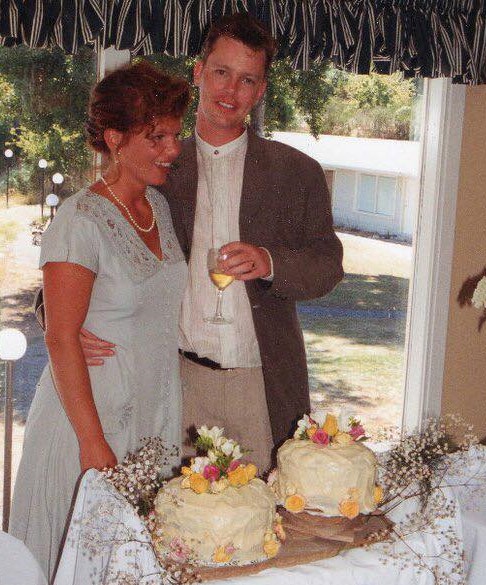
Wedding to Michael McKenzie, August 1994.
Following a brief interlude at Montreal General Hospital as a staff nurse in Bone Marrow Transplant/ Hematology/ Oncology, she returned to Vancouver in 1992 and began to teach nursing, first as a sessional instructor at Langara College and then as Assistant Coordinator in the Learning Resource Centre at the UBC School of Nursing, a position that also allowed her to begin graduate studies on a part-time basis. After completing her MSN in 1998, she returned to the BC Cancer Agency, moving through a series of Clinical Nurse Specialist and practice leadership positions to become the Regional Professional Practice and Academic Leader for Nursing. Within that position, she retained her active engagement with UBC School of Nursing as an Adjunct Professor, supported the development of oncology specialist nursing practice throughout the Agency, and co-founded and established the Complementary Medicine Education and Outcomes (CAMEO) program with Lynda Balneaves, a collaborative BCCA/UBC School of Nursing knowledge translation research program, and joined the Pan-Canadian Oncology Symptom Triage and Remote Support Collaboration (COSTaRS), led by Dawn Stacey at the University of Ottawa. She enthusiastically encouraged BC cancer nurses to become increasingly active in national oncology nursing initiatives and developed collaborative projects to develop innovative models of care that optimized nursing expertise in ensuring that the distinctive needs of all cancer patients within the system could be met.
Unfortunately, following a shift in the leadership vision at that time, BCCA determined that research and practice initiatives were inconsistent with its expectations of the appropriate role for its nursing workforce, and Tracy was terminated from her position in late 2010. Given her prominence within the BC cancer care system, and the extent to which she was admired by nursing and interdisciplinary colleagues provincially and nationally, Tracy’s termination sent shockwaves through the system. In that BCCA was essentially the monopoly employer of specialized oncology nurses in the province, this placed Tracy at a difficult crossroads. In characteristic style, she did not want her situation to demoralize her colleagues, so decided to rise from the ashes, and remain active in voluntary cancer care system activities, including her research. She was accepted into the September 2011 cohort entering the PhD program at the UBC School of Nursing, where she absolutely thrived, quickly creating a lively hub of dialogue and mutual support with new colleagues, including international visiting students and scholars, and developed networks of mutual support among Canadian oncology nurses studying at the doctoral level across the country.
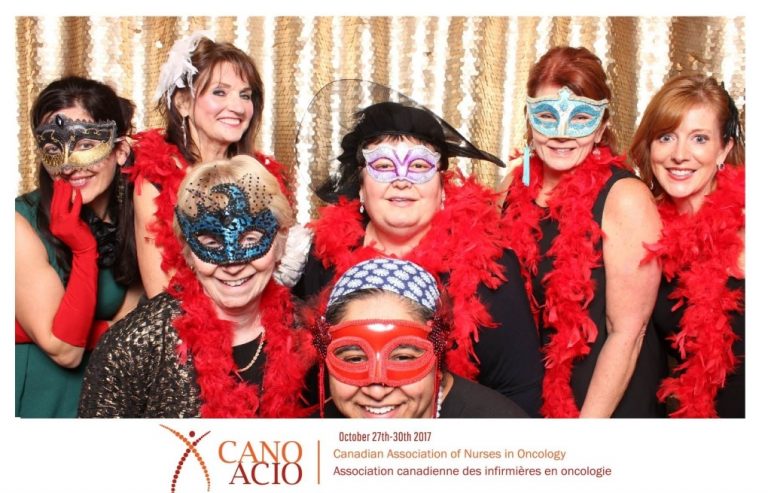
With some of her many BC oncology nursing colleagues “incognito” at the Canadian Association of Nurses in Oncology Conference Gala, Gatineau, Quebec, October 2017.
Over these years, concurrent with her various formal roles, Tracy also worked nationally through the auspices of the Canadian Association of Nurses in Oncology (CANO) to develop, implement and evaluate nursing standards, competencies, guidelines, and practice tools. She also worked internationally through the International Society of Nurses in Cancer Care (ISNCC) to build capacity in using knowledge translation strategies for oncology nursing practice across Latin America. She was active in numerous capacities in these organizations, leading the advancement of numerous strategic initiatives, including establishing numerous international partnerships and collaborations. She played a particularly active role in CANO over many years, serving on its Board of Directors in various capacities, and ultimately taking leadership as Vice-President (2013-2015) and President (2015-2017).
Tracy’s own PhD studies were progressing well despite her sustained activity in these professional societies and her ongoing participation in research collaborations. She had secured doctoral fellowship funding through the highly competitive Frederick Banting and Charles Best Canada Graduate Scholarship fund (in fact, her application was ranked second of the almost 600 applications in the psychosocial and behavioral research pool that year). She was also awarded Fellowship funding from the Canadian Nurses Foundation /TD Meloche Monnex Scholarship fund and was part of the Psychosocial Oncology Research Training (PORT) program – a CIHR Strategic Training Initiative in Health Research based at McGill University. She assumed leadership of the Graduate Nursing Students Association and launched research conferences and events in support of UBC Nursing and interdisciplinary graduate students.

With Sally Thorne’s trainee group: Kim Jamieson, Joyce Zhuang (China), Rafaela Azevedo Oliviera (Brazil), Vanessa da Silva Carvalho Vila (Brazil), Jagbir Kaur, & Jennifer Stephens, March 2017.
Following completion of the formal course requirements, she attained candidacy and began working on an ambitious dissertation on the topic of Exploring Equitably High Quality Cancer Survivorship Care, supervised by Sally Thorne, with Colleen Varcoe and Carolyn Gotay serving as supervisory committee members. That year, she was humbled to be recognized by the Association of Registered Nurses of BC with its Excellence in Advancing Nursing Knowledge & Research Award. And she was well on target for spring completion of her dissertation when, in the wake of a new administration at BC Cancer Agency, Bernice Budz, then VP Patient Experience and Interprofessional Practice, opened up a new window of opportunity in oncology nursing research leadership.
In November 2017, Tracy was appointed Provincial Director, Research & Innovation at the BC Cancer Agency. This was absolutely her “dream job,” allowing her to guide the strategic planning, development, delivery, and evaluation of high-quality nursing and allied health professional education and education services, mentorship, research, and knowledge translation activities at BCCA. The role was designed to help optimize the uptake of evidence-informed practices through research and provide education and mentorship to enhance knowledge and skills and foster a culture that values clinical inquiry and excellence in care. She immediately began working to create highly functioning teams of clinicians, educators, researchers and leaders to engage in collaborative research designed to generate new knowledge that could inform cancer care practices across British Columbia and beyond.
And then, within a few short months of starting that new position and continuing to try to finish her dissertation, everything suddenly changed. As Tracy later explained in the Prologue to her dissertation document:
The completion of a dissertation does not always go according to plan, and mine is no exception. In late 2017, my work on it was disrupted by a wonderful professional opportunity to which I could not say no. I thrilled to be hired into the brand new role of Director, Research, Education and Innovation at BC Cancer – the coordinating body for cancer care across the entire province of British Columbia, Canada. This was an interprofessional leadership role designed to establish and evaluate education, knowledge translation, and research frameworks and initiatives across the province-wide cancer care services. It was an opportunity to return to the organization from which I had departed under much different circumstances eight years previously, and to be positioned such that I could actually play a meaningful role in enacting the kinds of initiatives that a research project such as this one aspires to inform. Temporarily, as I dove into the work, the dissertation writing was put on hold, although my enthusiasm for and engagement with the ideas within it continued.
In April of 2018, after only 6 months in my dream job, I was diagnosed with glioblastoma. It became clear over the ensuing months that the dissertation in the full scope with which I had intended it was no longer an option. However, with the assistance of those around me, I have been able to bring together the notes and records that demonstrate the line of reasoning that would have been there within the final chapters had I been able to write them, so that I can bring this process to a close for now. There is, naturally, much more to be written on the topic and many stories to tell on the basis of what I have learned from the people and processes I have studied, and I hope that I will be able to contribute to that.
At the time of her diagnosis, the top item on Tracy’s “goals of care” list was to complete that dissertation and earn the PhD for which she had worked so hard. With the help of a team of friends and colleagues, she was able to bring the writing process to an adjudicated conclusion. UBC School of Nursing, the Faculty of Graduate Studies, and the central administration all worked together to find a creative path forward that would allow Tracy to achieve her dream despite being unable by that time to participate in the requisite oral defense. She was formally awarded her PhD in a special private graduation ceremony held in the backyard of the family home on August 8, 2018. Her dissertation is available to all in the UBC Library cIRcle Repository.

PhD Graduation, August 8, 2018.
In late October of 2018, the Canadian Association of Nurses in Oncology bestowed on Tracy its “Lifetime Achievement Award.” Although she had high hopes of being able to travel to Charlottetown, PEI for the ceremony, another downturn in her health made that impossible. However, despite significant difficulties with putting her ideas into speech at that time, she was able to audio-record a statement that captured her gratitude to her oncology nursing colleagues, and these were included in a video presentation to that audience on that day.
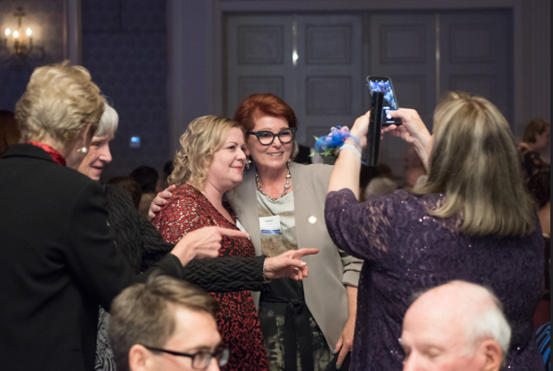
Being celebrated by friends at the UBC School of Nursing Centenary Awards Gala May 2, 2018.
On May 2, 2019, Tracy was delighted to be among those awarded the UBC School of Nursing Centenary Medal of Distinction. That award served “to recognize individuals who have brought high honour to the School of Nursing or to the profession of nursing, and/or who have made long-standing/significant contributions to advance the school’s vision, mission and mandate.” Due to a new chemotherapy that afforded Tracy better ease of communication and general wellbeing, she was able to attend that Gala event in person, and she thoroughly enjoyed the celebration along with many longtime friends and colleagues.
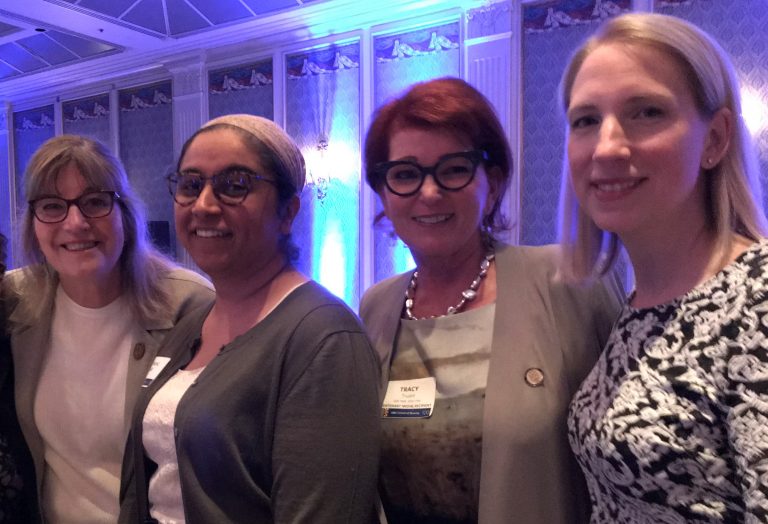
With Shelley Canning, Jagbir Kaur & Leah Lambert at the Centenary Gala, May 2, 2018
In Tracy’s very first nursing job at BC Cancer (then called Cancer Control Agency of BC), an early mentor in oncology nursing was a young Scottish nurse named Janie Brown (MSN’92), who later went on to co-found the Callenish Society and become a leading international expert in death and dying. When it came time to write up Janie’s story for the UBC Nursing Amazing Alumni site, Tracy was delighted to contribute and recalled how much she had learned from Janie in those early years. She wrote “I am in awe of Janie’s role modeling of how to use humility in supporting patients, families and health professionals through their cancer journey, and especially into the end of life.” And in the wonderful way of life’s evolving circles, Janie and Callenish became a primary guide for Tracy, her husband Michael, and their two adult daughters, Sophie and Molly McKenzie, through the trajectory of her advancing illness experience. In Callenish retreats and in consultations with Janie, Tracy opened herself to matters of life and impending death in a manner she found incredibly healing. In particular, these sessions helped her look toward the ending with an approach that felt completely characteristic of the way she had lived her life – with pragmatic realism and persistent optimism. Colleague Rosemary Cashman interviewed Tracy and Janie about that deep connection, and the interview was reported in a BC Cancer newsletter for brain cancer patients in late 2020.
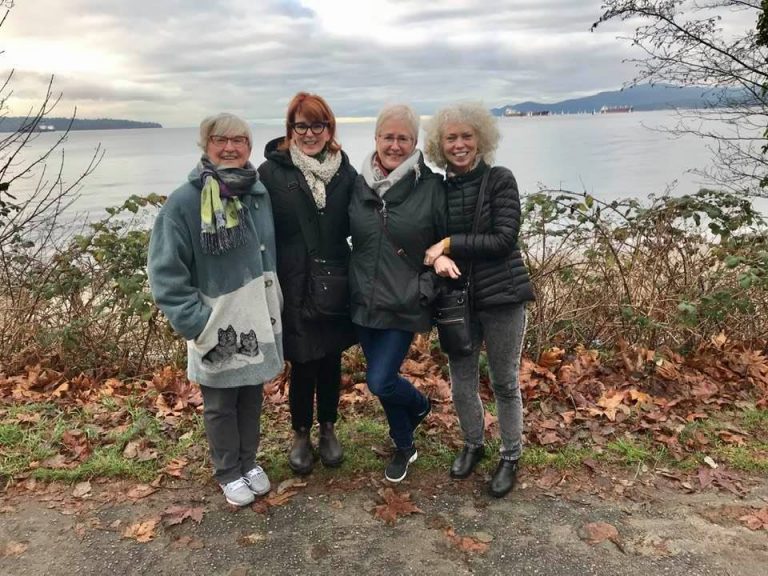
With longtime cancer nursing colleagues Brenda Ross, Karen Levy & Rosie Cashman, December 2019
Having worked so hard to attain her status as a nurse researcher, Tracy was eager to continue to engage to the extent possible in research and writing. With the support of colleagues in the work of manuscript preparation, she was able to publish an overview of her dissertation research in the Canadian Oncology Nursing Journal in late 2019.
Following that, she remained enthusiastic about continuing research meetings on a regular basis, ultimately resulting in completion of analysis of some of the dissertation data that had been abandoned in 2018. Tracy was delighted when, on March 12, 2020, we learned that her final paper had been accepted for publication in the journal Global Qualitative Nursing Research.
For a scholar whose post-PhD research career was so quickly curtailed, Tracy left behind an enormous and important body of original scholarship. As of March 2021, her publication record included 40 peer-reviewed scholarly papers, she had given dozens of invited presentations and delivered papers at conferences across the globe. Her Google Scholar h-index was 14 and she had been cited over 725 times. She also left her footprint on a body of knowledge translation work, through national standards and guidelines for cancer nursing and cancer survivorship care. But her larger legacy is her commitment to cancer nursing and the care of all cancer patients in BC, Canada, and beyond. Those who have been privileged to know her in all of her various capacities have been truly touched by someone who is indeed larger than life.
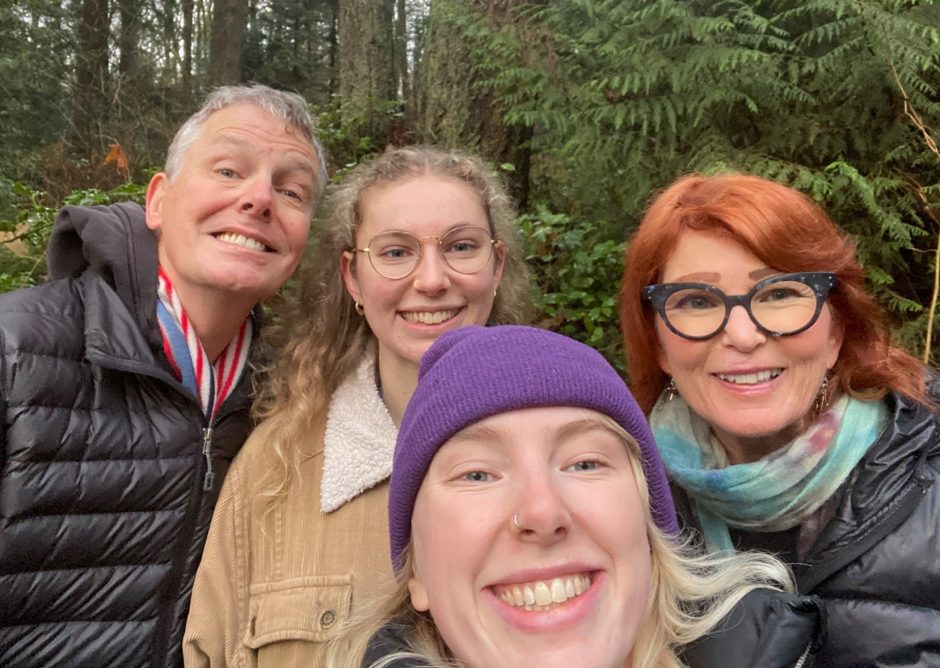
With Michael McKenzie, Molly McKenzie & Sophie McKenzie, Dec 2020
Tracy died on April 8, 2021, peacefully and with dignity, at home with her husband Michael McKenzie, and daughters Sophie McKenzie and Molly McKenzie by her side. She is mourned and remembered by an exceptionally wide circle of colleagues, friends, and extended family.